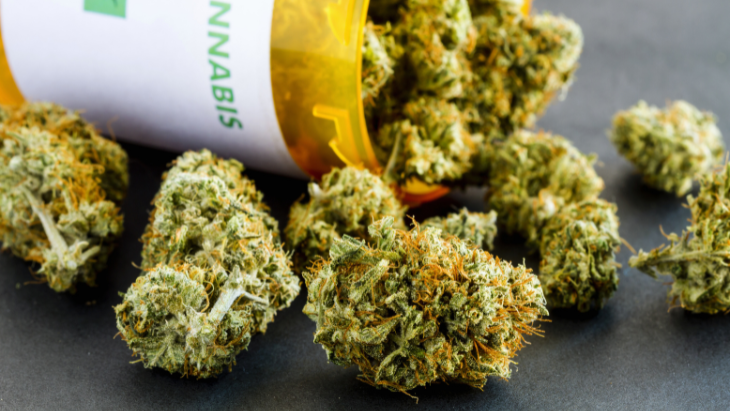[[“value”:”
State-level marijuana legalization is associated with declines in prescription drug spending, according to data published last week in the journal Health Economics.
Researchers affiliated with Bowling Green State University in Ohio and Illinois State University assessed the impact of marijuana legalization laws on prescription drug expenditures among privately insured working-age adults.
They identified pronounced declines in prescription drug expenditures among enrollees of small group insurance plans (plans typically sold to employers with fewer than 50 employees).
“We find that net prescription drug claims in small group insurance markets are reduced by approximately six percent following recreational cannabis legalization,” they determined. “The reduction in claims in the small group market grows stronger in magnitude over time and gains statistical significance during the second full year of legalized cannabis.”
Investigators did not identify a similar reduction among enrollees in large group insurance plans. Researchers speculated that this null result could be because larger companies typically impose mandatory marijuana testing among their employees.
“Recreational cannabis laws result in significant relative declines in prescription drug claims that are concentrated in small group insurance markets,” the study’s authors concluded. “The legalization of cannabis offers a potential substitute to traditional prescription drugs and alternative methods for health maintenance.”
The study’s findings are consistent with those of others concluding that marijuana legalization is associated with lower health care premiums and reduced Medicaid spending.
Commenting on the data, NORML’s Deputy Director Paul Armentano said: “Cannabis has established efficacy in the treatment of multiple conditions, including chronic pain, and it possesses a safety profile that is either comparable or superior to many prescription medicines, like opioids. As legal access continues to expand, one would expect more patients to integrate cannabis products into their wellness strategies in a manner that reduces their overall disease burden as well as their reliance on traditional prescription medications.”
The full text of the study, “The effects of medical and recreational cannabis laws on prescription drug claims in commercial group insurance markets,” appears in Health Economics. Additional information on prescription drug substitution is available from NORML’s fact-sheet, ‘Relationship Between Marijuana and Opioids.’
“]] “We find that net prescription drug claims in small group insurance markets are reduced by approximately six percent following recreational cannabis legalization.” Read More


